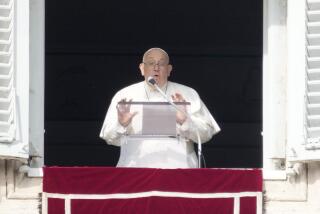Episcopalians Take Middle Road on Gay Issue : Sexuality: National convention is unable to reach consensus on ordination of homosexuals or blessing of same-sex couples.
PHOENIX — The Episcopal Church has avoided what could have been a major fissure in the 2.4-million-member denomination by adopting a compromise measure on the volatile issue of homosexuality that essentially retains the church’s current teaching on the issue.
At the same time, the failure of 1,050 bishops, priests and lay deputies to reach consensus at the church’s national convention on subjects such as ordination of homosexuals and the blessing of same-sex couples guarantees that those subjects will continue to be controversial topics in the church until at least the next General Convention in 1994.
During extensive debate during the convention that ended last week, delegates rejected proposals from the extremes and opted for a measure that affirms the church’s traditional teachings limiting sexual relations to married couples while acknowledging a “discontinuity” between those teachings and the experience of many Episcopalians.
The measure asks each of the church’s 121 dioceses to initiate studies of sexuality at the parish level to be used in development of a “pastoral teaching” on sexuality before the 1994 convention.
In practical terms, the convention action leaves the church in an ambiguous status quo on the question of ordaining practicing homosexuals: A resolution adopted by the 1979 General Convention calls ordination of active homosexuals inappropriate, but some bishops have disregarded that resolution and others have said they consider it advisory.
Bishops declined a move to censure Bishop Ronald Haines of Washington and Bishop Walter Righter, a former assisting bishop in Newark, N.J., for ordaining, respectively, a lesbian as a priest and a gay man as a deacon.
Several prelates argued that Haines and Righter should not be singled out because other bishops have also performed such ordinations, albeit in a less public way.
In contrast to the heated tones that have frequently characterized debate over homosexuality in the Episcopal Church in recent years, most reaction to the convention decision appeared measured and temperate, although the traditionalist Episcopal Synod of America issued a strongly worded statement saying the church is “radically divided on fundamental questions.”
Presiding Bishop Edmond Browning, who is known to be sympathetic to the homosexual viewpoint but has sought to steer a middle course as head of the church, told reporters at a news conference: “My hope is we can continue searching. I have the sense today that regardless of what side people are on, they’re far more willing to listen to people on other sides than they were when they came in.”
He said the vote showed there is “a center that wants to hold the church together.”
The Rev. Todd Wetzel of Episcopalians United, an Ohio-based traditionalist group that used its estimated $1-million budget in the past year on convention matters, said: “Conservatives and the traditional folk have seen some progress since 1988, but not enough.
“I think we have three more years in which to save the structure of the national church,” he said. “I think we’ll be right back in 1994 to go at it again.”
Edgar Byham, spokesman for Integrity, the church’s gay and lesbian caucus, said the conservative backlash expected after the highly public ordinations of three active homosexuals in the last 18 months was not nearly as strong as feared.
He predicted: “We’ll never go back to square zero on sexuality. “Except for the far extremes, there’s been a remarkable spirit of loving and listening.”
Byham predicted also that the Episcopal Church will begin to consider blessing same-sex relationships no later than its 1997 convention. Browning, the presiding bishop, and Byham both made reference to the stormy goings on within the Presbyterian Church (U.S.A.) earlier this summer over the contentious denominational report that recommended liberalizing traditional church teachings on sexuality but was soundly rejected at the Presbyterian General Assembly.
One lesson Episcopalians learned from the Presbyterian experience, Browning said, is that local churches must be intimately involved in studying changes in traditional teaching.
Browning also noted that the Episcopal convention’s message for other churches studying sexuality is that “if we’re really serious about having that grass-roots study, the gay and lesbian community must be brought into the discussion.”
More to Read
Sign up for Essential California
The most important California stories and recommendations in your inbox every morning.
You may occasionally receive promotional content from the Los Angeles Times.









